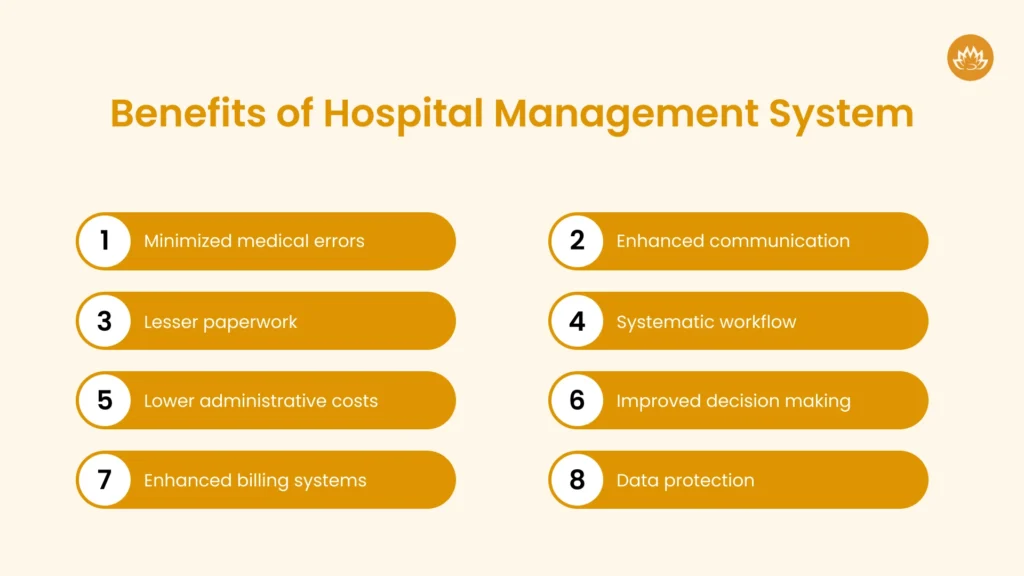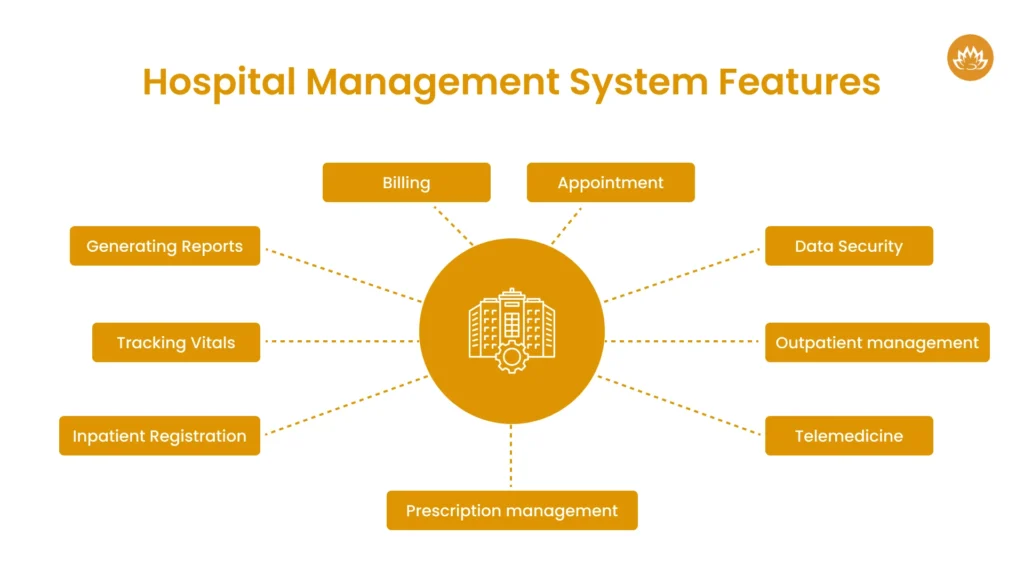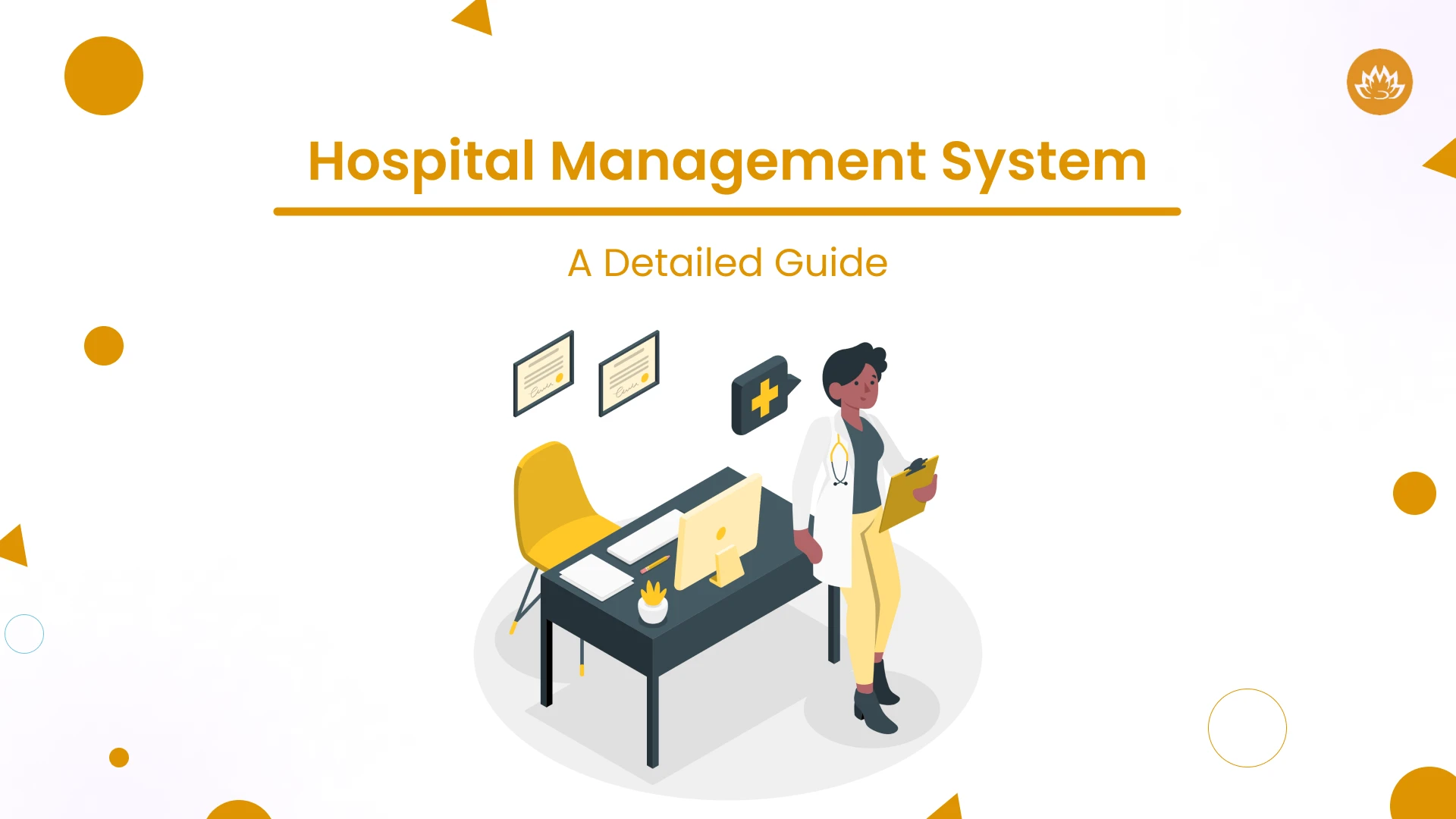Are you planning to improve management in your hospital? Do you need innovative healthcare software to handle day-to-day operations? With a hospital management system, you can manage the operations of the entire hospital simultaneously, with a focus on enhancing patient experiences. Nowadays, healthcare providers use advanced technologies to empower themselves, avoid overwhelming paperwork, and avoid minor delays. They can offer better medical services and seamlessly manage patient records.
Several medical service providers recently sought assistance from custom healthcare software development for building tailored hospital management systems. Today, smart hospitals are thriving with high-tech healthcare software systems that can streamline core clinical operations, helping doctors focus on improving patient care services. As technology continues to play a catalyst role in the healthcare sector, we want you to understand the importance of a hospital management system and what kind of services it can offer.
Let’s dive into the details.
What is a Hospital Management System?
Hospital management systems are comprehensive digital software that facilitates healthcare providers’ management of key processes such as administrative tasks, processing patient medical records, and providing seamless patient care. They also help healthcare staff collect, preserve, and share patient data within the healthcare facility with utmost security. A well-developed hospital management system can provide a thriving ecosystem of software applications that physicians, technicians, labs, nurses, and medical staff can use to obtain data and make informed decisions.
A recent Forbes study found that 49.2% of doctors spend their crucial time doing intense paperwork, wasting patients’ time. Paperwork is inevitable; however, doctors can save enough time through process automation and building robust healthcare software systems. For example, EHR software development has been ramping up recently as it empowers doctors to access patient medical health records on the move, any time and from anywhere, including managing clinical workflows seamlessly. Another example is Telemedicine app development – it has shown considerable growth post-pandemic, enabling patients to schedule doctor appointments and seek consultation through virtual meetings eliminating the need to visit the doctor in person.
Benefits of Having a Hospital Management System

If you hire dedicated developers to build a robust hospital management system, it can provide you with several benefits. Some of the significant benefits are as follows:
Minimized medical errors
A well-built HMS can reduce medical errors and automate tasks. It can help healthcare providers such as clinicians, doctors, and nurses access patient data. An automated HMS can dramatically reduce errors and enable hospital staff to protect themselves from regulatory issues by complying with regulations. Moreover, implementing HMS can help healthcare providers enhance patient care and operational efficiency.
Enhanced communication
HMS helps ensure seamless communication between patients and clinicians. It provides a robust platform for sharing patient information through a portal. Patients can use this portal to check their scheduled appointments and test results and can send messages to doctors. Also, HMS improves patient engagement and overall healthcare services.
Lesser paperwork
HMS reduces paperwork through task automation, including billing, insurance claims, appointment scheduling, and more. Therefore, the hospital staff can focus more on delivering quality patient care, thereby improving the hospital’s credibility.
Systematic workflow
HMS can also streamline day-to-day operations and workflows, reducing manual data entry. An efficient hospital management system can improve operational efficacy, benefiting workflow optimization and staff utilization.
Lower administrative costs
HMS is a savior to the administrative team, seamlessly automating tasks like appointment scheduling and other daily operations. This allows healthcare providers to reduce unnecessary staff augmentation and deliver quality patient care with the minimum resources.
Improved decision making
When hospital administrators receive accurate patient information and desired data through an HMS, they are empowered to make informed decisions, allocate adequate resources, and improve patient care. With an efficient HMS, healthcare providers excel in their major operations, such as enhanced patient care and resource utilization.
Enhanced billing systems
HMS improves billing accuracy with powerful task automation. It can perform regular administrative billing tasks such as insurance verification and claims processing. This benefit allows healthcare providers to optimize their revenue collection from patients to insurers easily.
Data protection
Sensitive patient data protection is crucial and requires a robust security system. HMS is one such tool that can protect enormous amounts of patient data, ensuring HIPAA compliance and privacy regulations. All the patient data gets safeguarded with advanced security protocols.
Top Modules in Hospital Management System

Several HMS modules are available in hospitals, each used for specific purposes. It depends on the kind of requirements hospitals have. Some of the most common modules are:
Patient Management Module
- Manage patient registration, medical history, and demographics
- Helps in appointment scheduling, rescheduling, or cancellation
- Keeps a check on patient admissions, discharges, and transfers.
Clinical Management Module
- Manages and maintains electronic medical records (EMR) patient-wise
- Clinical notes maintenance, diagnoses, prescriptions, and treatment plans
- Helps seamless communication between doctors, nurses, and healthcare professionals.
Radiology Management Module
- Stores and manages medical images like CT scans, X-rays, and MRIs
- Helps radiologists review and report electronic images
- Radiology appointment scheduling and tracking exam results
Laboratory Management Module
- Automation of orders, tracking, and reporting of laboratory tests
- Laboratory equipment integration with HMS to deliver faster results
- Inventory management of the laboratory regarding supplies and reagents
Billing and Revenue Cycle Management Module
- Helps manage patient billing and insurance claim processing
- Tracking of outstanding amounts for payment and receipts
- Financial reports for hospital administration
Inventory Management Module
- Tracks level of inventory such as medical supplies, pharmaceuticals, and equipment
- Generation of purchase orders and managing vendors
- Inventory level optimization and cost reduction, preventing stockouts
Pharmacy Management Module
- Manages inventory of medications and medical supplies
- Electronic processing of creating prescriptions and dispensing
- Keeps a check on medication administration and patient allergies
Reporting and Analytics Module
- Creates reports regarding hospital metrics, including appointment compliances, patient volumes, and financial performance
- Helps hospital administrators to make data-driven decisions
- Finds out areas of improvement and tracks the progress
Human Resource Management Module
- Handles employee payroll, training, and other benefits
- Manages employee attendance and performance
- Aligns recruitment and onboarding process
Features of a Hospital Management System

Some of the most essential features that you need to integrate into your hospital management system are as follows:
Billing
This feature reduces administrative efforts such as cost estimation and collecting billing information.
Appointment
The feature gives patients access to schedule appointments and track their progress.
Generating Reports
With this feature, healthcare professionals can generate insightful reports based on data and track performance through various metrics and graphs, leading to informed decision-making.
Data Security
It is the most essential feature that protects sensitive patient data, from personal details to various reports and lab tests.
Inpatient Registration
It provides centralized access to all information stored, including bed availability and admission of new patients.
Tracking Vitals
This feature makes tracking and exchanging patient vitals quick and easy.
Outpatient management
This feature helps to perform quick registration, outgoing patient process, discharge reports, and receiving final payments.
Prescription management
It helps physicians to renew prescriptions and cancel previous prescriptions.
Telemedicine
It allows patients to get follow-up visits in multiple locations without needing physical appearance at the doctor’s office.
Ready to revolutionize your hospital's operations and enhance patient care with a cutting-edge Hospital Management System?
Our dedicated developers are here to build a tailored solution that fits your unique needs.

What is the Cost of Building a Hospital Management System?
The cost of developing an efficient hospital management system differs based on many aspects. Developing a basic HMS that caters to more straightforward needs can cost around $30000 to $35000. With such type of HMS, hospitals can practice core functionalities like patient registration, appointment scheduling and billing.
Large hospitals that need to handle massive patient data need additional features. It requires a complex HMS that can perform multiple tasks and has more modules like laboratory management, radiology management, etc. Developing such software costs $70000 to $140000.
Conclusion
The hospital management system is necessary to ensure the smooth functionality of modern healthcare facilities. It can showcase immense potential to improve communication at various levels, provide enhanced patient care and services, and centralize operations. With the growing technology advancements, you will need a hospital management system someday. For that, you can partner with a well-established software development company that can help you streamline your healthcare operations.
Whitelotus Corporation is a leading custom healthcare software development company delivering robust healthcare software systems. You can hire dedicated developers from Whitelotus Corporation to build small and large-scale hospital management systems. We know how to harness the tools and functionalities of various technologies to create the best solutions that will meet your expectations.
FAQs
What kind of challenges are involved in HMS development?
HMS may confront some of the main challenges: compliances, cybersecurity, development costs, and IT infrastructure. You can partner with a reliable software development company like Whitelotus Corporation to solve these challenges.
What are the different types of hospital management systems available?
According to various software models that can be made available, there can be two types of HMS software. One is an on-premise HMS used for internal data, and the second is a cloud-based HMS that can be public, private, or hybrid for software hosting.
Author
-

Kirtan is CEO of Whitelotus Corporation, an emerging tech agency aimed to empower startups and enterprises around the world by its digital software solutions such as mobile and web applications. As a CEO, he plays key role in business development by bringing innovation through latest technical service offering, creating various strategic partnerships, and help build company's global reputation by delivering excellence to customers.
View all posts












